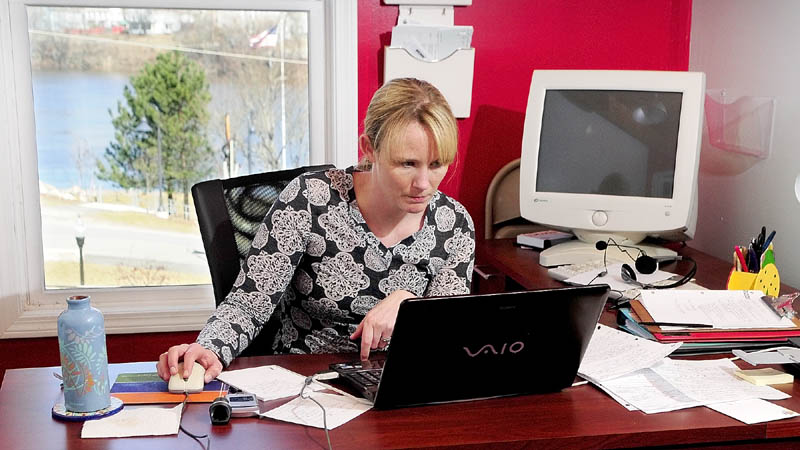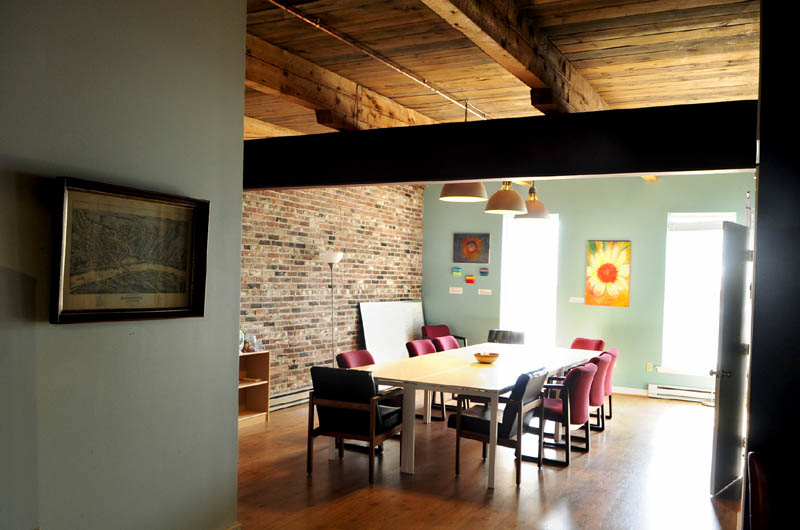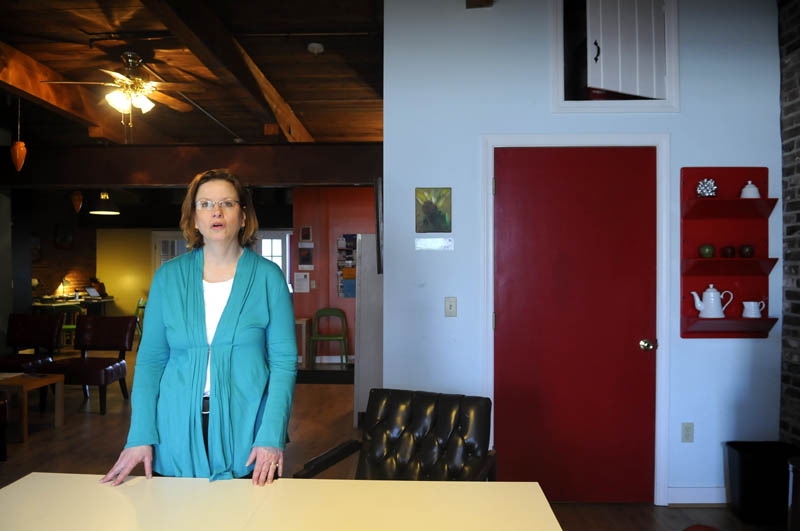GARDINER — Sara Martin drives down from Bangor two days a week and shares a desk in the co-working space called CoLab at 177 Water St.
Martin is contracted by the city as the historic preservation program manager. The city leases her desk for $50 a month. Martin said she has access to WiFi and the professional copier, and a large conference table that can be reserved for meetings.
That trend in shared office spaces is emerging in central Maine. In addition to the Gardiner location, another company has started a co-office space in Readfield.
Co-working spaces emphasizes open floor plans and flexibility on leases.
“I meet with the (city’s) Historic Preservation Commission to review applications for alterations to the historic district, so this is great,” Martin said. “It puts me downtown in the historic district. And the other great thing is Gardiner Maine Street is here. We have a lot of overlapping interests.”
The brightly painted walls and ceiling pendant lights covered in pear-shaped glass shades with swirls of red and orange make for a vibrant place to work.
Patrick Wright, executive director of Maine Street program, has the corner office. Last June, the program moved to CoLab from 287 Water St. The lease is the same as his old space, but it includes heat, electricity, Internet, use of the copier and a more spacious conference room — albeit less private.
“One even more important benefit, however, is the opportunity to have chance encounters with creative professionals working in Gardiner,” Wright said. “This gives the Main Street program an opportunity to be more engaged in the community, even when I’m doing office work.”
Nate Rudy, the city’s director of economic and community development, said the basic premise of co-working is to provide independent professionals with affordable office space, where the members share the costs associated with leasing, equipment and office maintenance.
“The co-work concept has taken off around the country in response to a new culture of virtual workers who connect with colleagues over smart phones, cloud networks and laptops,” Rudy said.
In fact, there are online directories of co-working spaces across the world. PelotonLabs and Think Tank are two co-working space in Portland.
According to the website of the online magazine Deskmag.com, a 2010 survey it helped conduct of co-working involved more than 600 people from 24 countries. The survey found that 70 percent of respondents were happy with their space. In addition, 85 percent of respondents also said they were more motivated, 88 percent said they have better interaction with other people now, while almost half said they now works in teams more often.
But the survey also found that one in four people were bothered by the level of noise in their co-working space and 14 percent “bemoan the lack of privacy or the inadequacy of the office infrastructure.”
Rudy said the city of Gardiner negotiated a rate with CoLab. The city is paying $350 for Martin and other people in his department to use the space until June.
CoLab is open free of charge for a limited time to economic and community development professionals working in the region, he said.
“Many of my circuit-riding development colleagues working in mid-Maine just need a place to stop in, check their email, take a breather, and maybe have a meeting with a local business or service provider before heading to another destination,” he said.
CoLab’s director, Kara Wilbur, said the four private offices are occupied, but there are work spaces in the common area available at $50 a month.
“The space is also available for rent by other groups,” Wilbur said. “If anyone wants to use the conference space there’s a $25 hourly rate. We have a whole pricing structure that depends on how long of a term you’re signing up for.”
CoLab has a Facebook page and will be holding a Pecha Kucha night — a multi-speaker event — in the next few months.
“It’s an opportunity to get to know your neighbors,” Wilbur said. “They’ll be able to share with each other what they do for work and a little bit about their lives so they can gain a greater understanding of the resources around them and the potential for collaboration.”
In January, construction was completed on a 2,700-square-foot co-working space at 11 South Road in Readfield. The Central Maine Community Office space is owned and operated by Syntiro, an education nonprofit that uses the office space for its five employees and can accommodate 15 additional people.
The space, which includes desks, offices and a conference room, can be leased on an hourly or monthly basis.
Syntiro’s president, Kathryn Markovchick, said she has just started recruiting people to move into the co-working space, which will cater to home-based employees of small- to mid-sized nonprofit groups in central Maine.
Markovchick said it is a perfect location for independent professionals who need a place to work, hold meetings, or collaborate with peers in a relaxed professional environment.
“It’s a beautiful location,” Markovchick said. “Every window is peaceful and relaxing and it’s close to Augusta. It’s an easy drive out here. That was my original thought. And also I wanted to target people in the area looking for some individual office space with a desk for a few hours.”
Lease amounts are determined by membership tiers, she said. For example, it costs $250 a month for access to a desk seven days a week, 24 hours a day. For use of a desk 8 hours a month, the cost is $40.
Mechele Cooper — 621-5663
mcooper@centralmaine.com
Send questions/comments to the editors.





Success. Please wait for the page to reload. If the page does not reload within 5 seconds, please refresh the page.
Enter your email and password to access comments.
Hi, to comment on stories you must . This profile is in addition to your subscription and website login.
Already have a commenting profile? .
Invalid username/password.
Please check your email to confirm and complete your registration.
Only subscribers are eligible to post comments. Please subscribe or login first for digital access. Here’s why.
Use the form below to reset your password. When you've submitted your account email, we will send an email with a reset code.